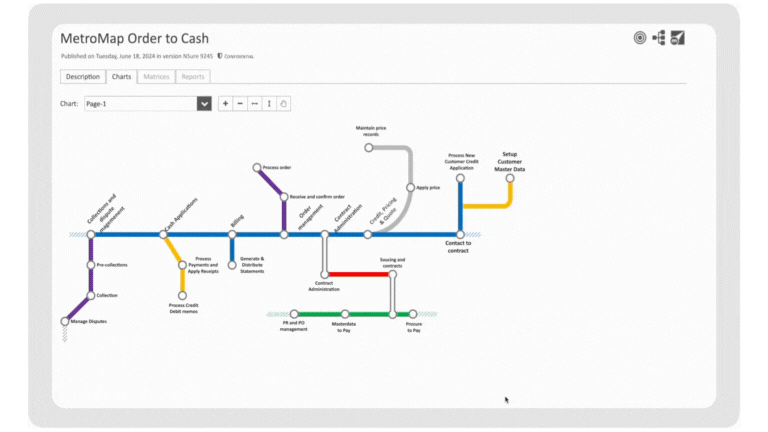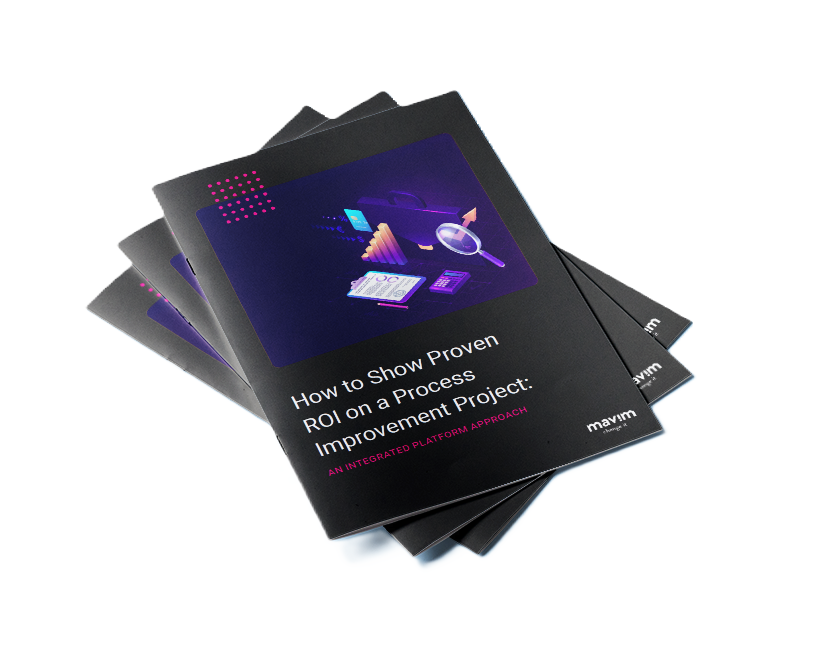What can Mavim Process Mining do for you?
Process Mining can be applied to your customer service, procurement, finance, operations, and other business areas. With Mavim Process Mining, you discover fact-based insights on how processes are executed. You can find process anomalies, compliancy conflicts, deviation patterns and investigate rework.
100% End-to-End Visibility
Get 100% overview of your process execution to detect rework activities and loopholes in the day-to-day operations of the IT ticket system.
Shorter Lead Times by 80%
Reduce throughput time by 80% between two activities through RPA implementation.
Increase Operational Efficiency by 59%
Identify process bottlenecks to lead to a 59% increase in operational efficiency.
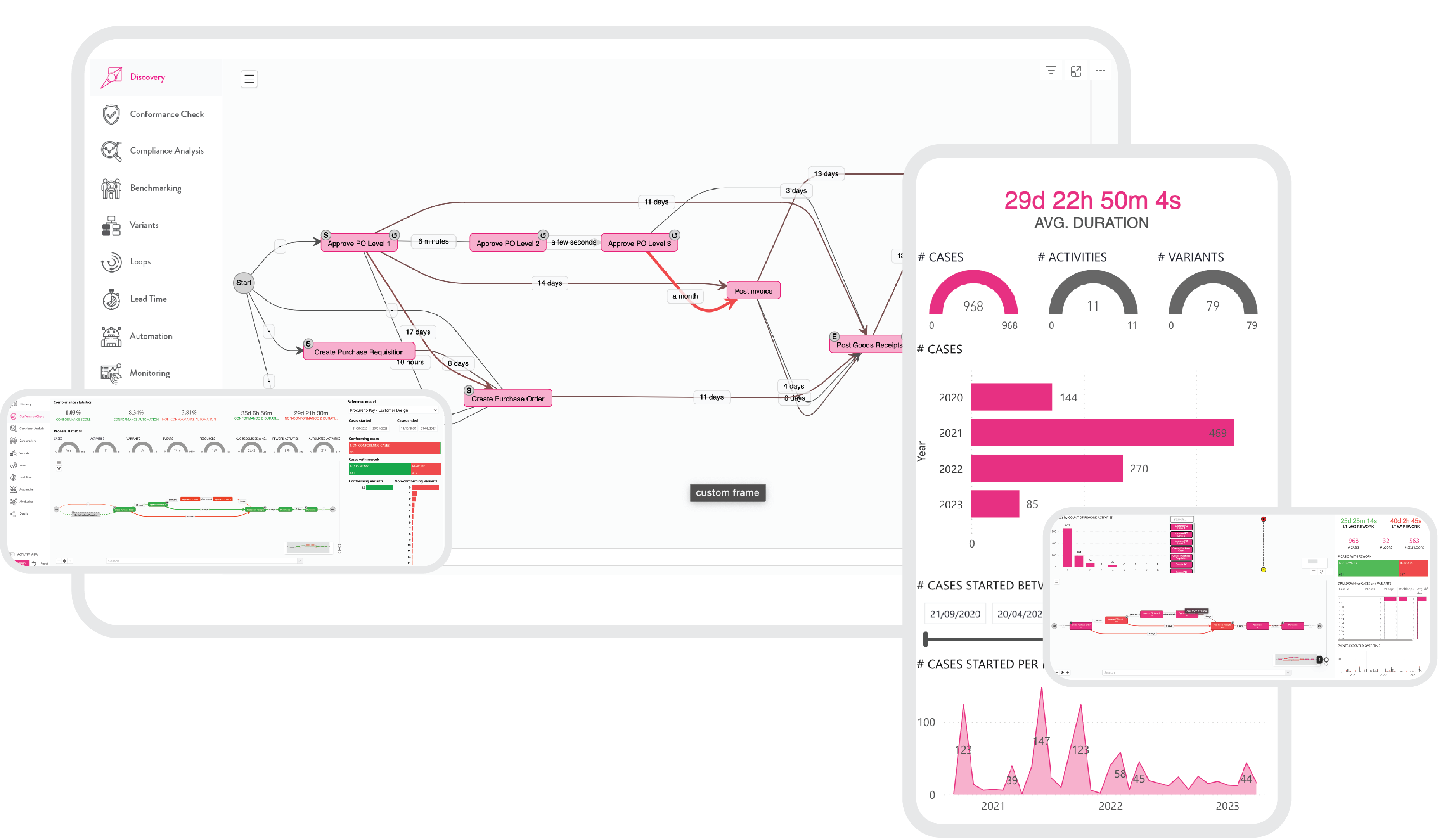
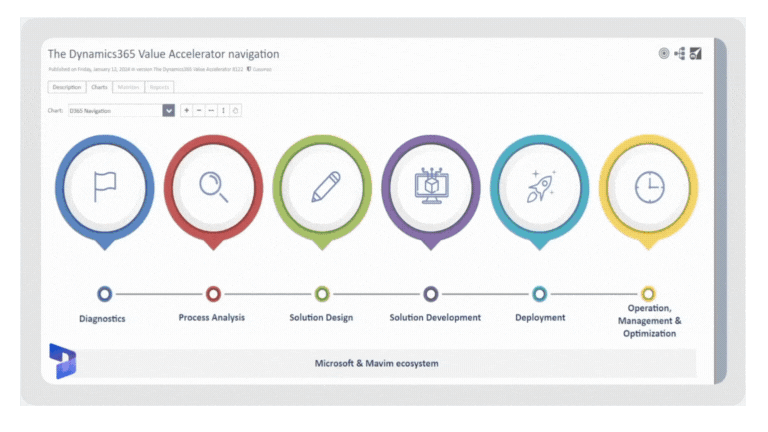
Process Mining Integrated with Power BI
Unlocking the full potential of your operations requires not only dedication but also the right tools and insights. That's where the synergy of Process Mining and Business Analytics, integrated with Power BI, becomes a game-changer. This powerful combination is more than just a strategy; it's a transformative journey that reveals the true Return on Investment (ROI) of your continuous improvement initiatives.
Our Process Mining technology works upon the following data:
-
Unique Objects
-
Activities
-
Timestamps
-
Data Points
Unlocking Process Insights Through Unique Objects
A unique object can be traced through parts of your process (ex. Sales Order ID).
By considering unique objects, process mining gains a more comprehensive and accurate view of the process. This enables:
- Deeper Process Understanding: Identifying complex relationships between objects and events.
- Improved Process Visibility: Tracking the lifecycle of objects through the process.
- Enhanced Process Optimization: Identifying bottlenecks and inefficiencies at the object level.
- Better Decision-Making: Supporting data-driven decisions based on object-centric insights.
Activities: The Key to Understanding and Optimizing Your Process
An activity or transaction status that is being executed (Ex. Sales Order Created)
Activities are the cornerstone of process mining for several reasons:
- Process Mapping: By identifying and analyzing activities, process miners can create a visual representation of the process flow, highlighting sequential relationships, dependencies, and potential bottlenecks.
- Performance Measurement: Activities serve as the basis for measuring process performance. Key metrics like cycle time, throughput, and resource utilization can be calculated at the activity level.
- Bottleneck Identification: By analyzing the frequency, duration, and resource allocation of activities, process miners can pinpoint areas where the process is slowed down or inefficient.
- Deviation Detection: Comparing actual process execution with the ideal process model often involves analyzing deviations at the activity level, identifying unexpected steps or variations in the workflow.
- Automation Opportunities: Understanding the nature of activities can help identify tasks suitable for automation, leading to increased efficiency and cost reduction.
Capturing the Pulse of the Process: The Role of Timestamps
A timestamp that tracks when the activity was executed (Ex. 2022- 10-20 13:45:22).
Timestamps are essential for several reasons:
- Sequencing Events: Timestamps establish the order in which activities occur, allowing for the construction of process models that accurately reflect the workflow.
- Measuring Duration: By calculating the difference between timestamps, you can determine the duration of activities, process instances, and wait times. This information is crucial for identifying bottlenecks and inefficiencies.
- Performance Analysis: Timestamps enable the analysis of process performance over time, helping to identify trends, seasonality, and anomalies.
- Resource Utilization: By correlating timestamps with resource assignments, you can assess resource workload and identify underutilized or overutilized resources.
- Root Cause Analysis: When investigating process deviations, timestamps can help pinpoint the exact moment when issues occurred, aiding in root cause analysis.
Variant Management Made Simple
Value adding data points can be added fo thorough drill through and benchmarking analysis.
By analyzing patterns and relationships among data points, process miners can:
- Discover Process Variants: Identify different ways a process can be executed.
- Identify Bottlenecks: Pinpoint areas where the process is slowed down.
- Measure Performance: Calculate key performance indicators (KPIs) like cycle time and throughput.
- Detect Deviations: Identify instances where the process deviates from the expected path.
- Optimize Processes: Suggest improvements based on data-driven insights.
Create impact with real data
Mavim Process Mining is your ally in swiftly pinpointing, refining, correcting, and setting priorities with your processes, guiding you towards the most efficient pathways for your business transformation efforts. With our innovative and supportive approach, you can dive into a comprehensive analysis, custom-designed for your unique needs. By exploring across diverse systems, you'll focus on the zones ripest for significant enhancements and value addition, ensuring every step forward is a leap towards transformation.
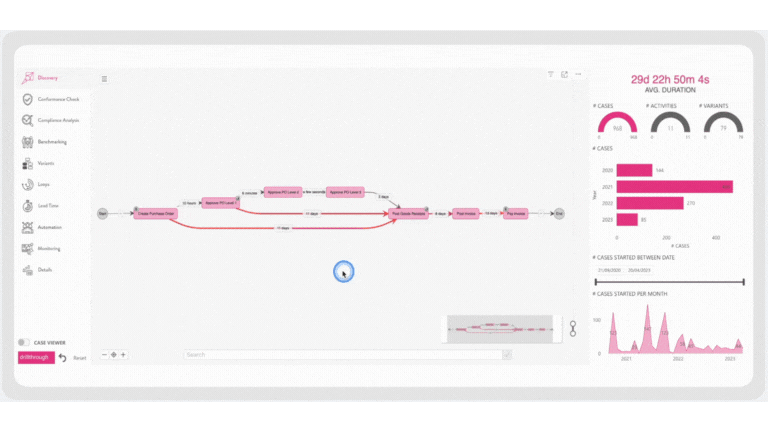
Ensuring Success: Monitoring Your Optimized Processes
The journey doesn't end with implementation. Every new or revamped process requires close monitoring to guarantee its effectiveness and avoid unforeseen consequences.
-
Track Key Metrics
-
Set Clear KPIs
-
Analyze Non-Conformance
-
Clear Reporting
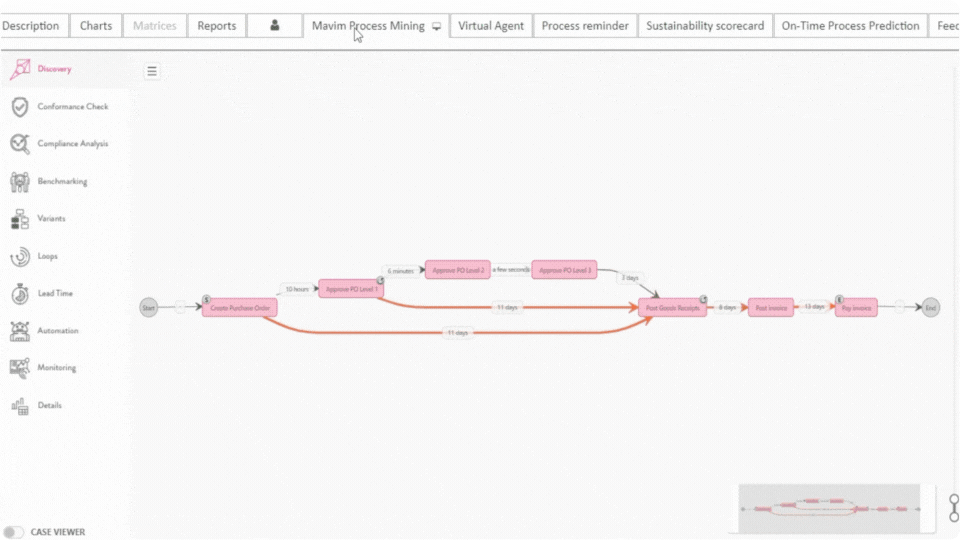
Track Key Metrics Around the Clock
Gain real-time insights into process performance.

Measure What Matters
Establish measurable benchmarks to gauge improvement success.

Understand Process Anomalies
Identify deviations from the standard process and understand their impact.

Generate Clear Reports and Pinpoint Variations
Consolidate performance data into easily digestible reports. Track the source of process deviations and address them promptly.
Process Mining Resources
Discover how to Show Proven ROI on a Process Improvement Project with Process Mining
Unlock the Power of Process Mining in D365 Implementations
Discover how Process Mining adds value to your Digital Twin of your Organization
Process Mining MQ (Gartner)
Discover how Mavim Process Mining is essential for building a successful Digital Twin of you Organization.
Process Mining as a DTO Capability
Discover how Process Mining adds value for the creation of a Digital Twin of your Organization (DTO)
Combining AI and Process Mining
Learn how to boost efficiency and productivity with Microsoft CoPilot and Mavim Process Mining.
Ready to get started?
If you’re looking to stay ahead of the competition and start transforming your business processes today, then request a personalized meeting with a Mavim expert to learn more about how we can help.
